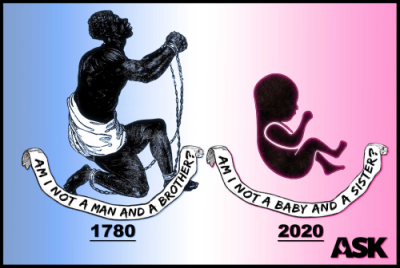Reflecting the abolitionist spirit after Dobbs

There are myriad parallels to be drawn between the pro-life movement and the abolitionist movement in America. Both have undertaken the fight against injustices of unspeakable magnitude. Both have asserted the inviolable dignity of humans made in God’s image. Both have been powerful forces for unity around the truth while also facing immense opposition.
One of the triumphant moments of the abolitionist struggle was the announcement of the Emancipation Proclamation on January 1, 1863. It represented an official recognition of what slavery’s detractors had fought so hard to affirm — that the evil of the slave’s bondage could not persist in a nation dedicated to freedom and equality.
The pro-life movement now faces its own moment of victory. Overturning Roe v. Wade as “egregiously wrong,” the Supreme Court has declared that the Constitution contains no protection for or mention of any right to an abortion, and that states have a legitimate interest in protecting unborn life. The ruling comes as an answer to countless prayers. It is a beacon of hope for advocates who have mourned the enshrinement of the killing of innocent children in our nation’s laws.
It will surely prove instructive, then, to examine how abolitionists responded to the Emancipation Proclamation, as we seek to follow in their footsteps.
Frederick Douglass spoke at the Cooper Institute in February of 1863, giving a speech entitled “The Proclamation and a Negro Army.” He said of the Emancipation Proclamation,
“It is a mighty event for the bondman, but it is a still mightier event for the nation at large, and mighty as it is for the both, the slave and the nation, it is still mightier when viewed in its relation to the cause of truth and justice throughout the world. It is in this last character that I prefer to consider it. There are certain great national acts, which by their relation to universal principles, properly belong to the whole human family, and Abraham Lincoln’s Proclamation of the 1st of January, 1863, is one of these acts … It will stand with every distinguished event which marks any advance made by mankind from the thraldom and darkness of error to the glorious liberty of truth.”
Another prominent abolitionist of the day was William Lloyd Garrison, editor of The Liberator. In January of 1863, The Liberator published a message from the Massachusetts Anti-Slavery Society, of which Garrison was a founder. It read,
“However effectual may be the President’s Emancipation Proclamation in breaking the chains of the bondmen in such rebellious sections of the country as he has just designated — and Heaven grant it may be as potent in operation as it is comprehensive in its scope; nevertheless, nothing at this hour is settled so surely as the continued enslavement of four millions of the inhabitants of the land; and while any of these remain to wear the yoke, the primary object and specific work of this Society will not have been accomplished. Slavery in the so-called loyal Border States is as inexcusable, as criminal, as revolting, as unendurable, as pregnant with evil and ruin, as in the rebellious Confederate States, and must be as vigorously and uncompromisingly assailed, until liberty is proclaimed throughout ALL the land, and to ALL the inhabitants thereof.”
The pro-life movement now requires a measure of both Douglass’s celebration and Garrison’s call to action.
We must remember, as Douglass did, that the success of our cause is not a matter of mere political victory — although millions of Americans have made their voices heard on behalf of the voiceless. Neither does Dobbs represent only a victory for the unborn — although our prayer is that a multitude of lives might be saved from destruction. Rather, Dobbs is the kind of victory Douglass described — a victory for truth and justice that resounds across the globe. To reduce this decision to a political spectacle or an example of good jurisprudence does a disservice to the momentousness of this occasion.
Yet in 1863, the Civil War was still being fought. The drops of blood drawn by the lash were still being paid by those drawn with the sword. In most of the areas where slavery had prospered, the Emancipation Proclamation did not yet have the force of law. Garrison urged his readers to consider, even in the midst of their rejoicing, the many people who remained enslaved.
Today, the legality of abortion is unquestioned in nearly half the states. Its scourge still poses a threat to justice and to the dignity of human life. We hope, as Garrison did, that the Court’s decision may be “potent in operation.” But we must not forget to continue the fight until a child’s right to life is “proclaimed throughout ALL the land, and to ALL the inhabitants thereof.”
Originally published Juicy Ecumenism.
Josiah Reedy is an intern with the Institute on Religion and Democracy. He recently graduated with a degree in political science and criminal justice from George Washington University. He is also a member of Capitol Hill Baptist Church and a lifelong Washingtonian.





















